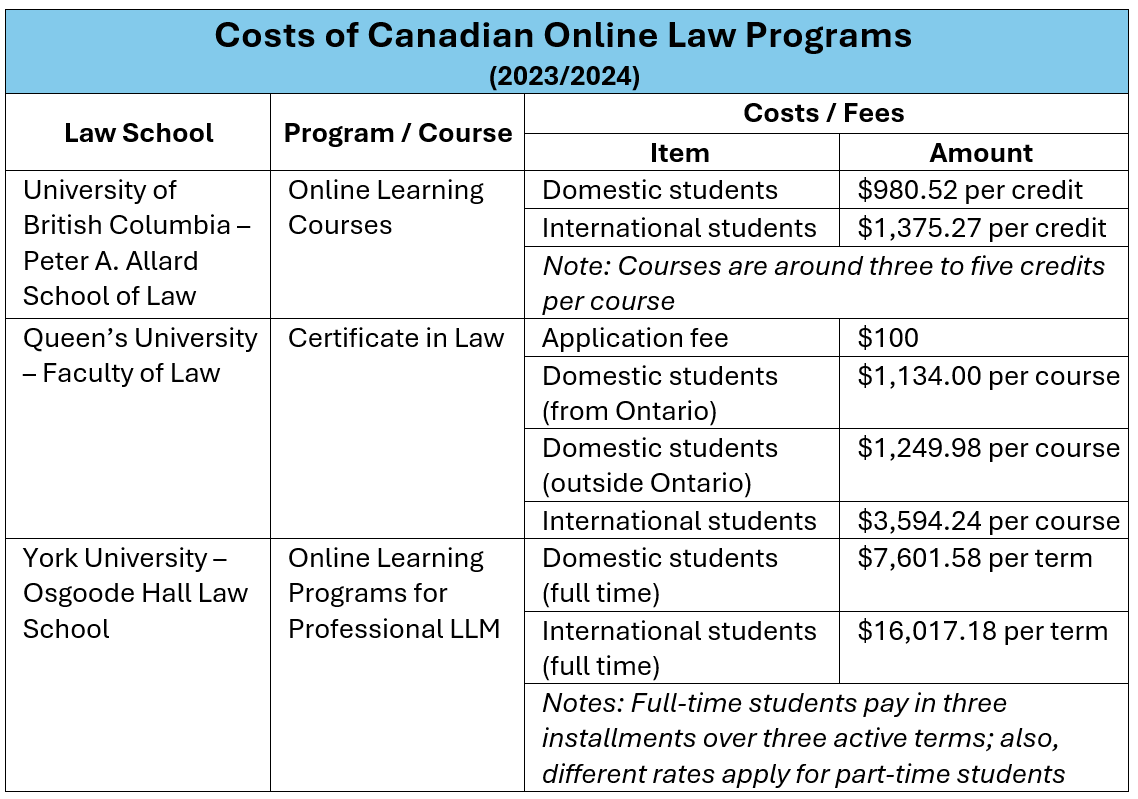
Explore the online law courses available in Canada and learn practical tips to help you succeed in online learning

If you’ve always wanted to study law but leaving your home or work is challenging, pursuing an online law program might be the solution. With these convenient programs, you can hit the books and pursue your legal dreams without having to leave home.
In this article, we’ll discuss some of your options so that you can still study law through online means. This article is for future law students, practicing lawyers, and other professionals who want to learn more about the law.
To become a lawyer in Canada, a Juris Doctor (JD) or Bachelor of Laws (LLB) degree is required. No Canadian law school currently offers a purely online JD or LLB curriculum.
There are law schools that offer online law programs, which can be:
In addition, these online law programs can also be taken in one of these ways:
One of the Canadian law schools that offer online learning programs is Osgoode Hall Law School at York University. It also happens to be one of the best law schools in Ontario.
Some of Osgoode’s programs, such as their Professional LLM (Master of Laws), can be taken virtually via their videoconferencing platform. Know more about this method of online learning by Osgoode with this video:
If you’re also considering attending law school in person, check out our comprehensive list of Canadian law schools for more details.
Most online law programs offered by Canadian law schools can be:
It’s important to know the specific details of the course you would like to take, since each of them is different when it comes to its course objectives and results.
Here are some of the important points to look at when choosing the best online law course for you:
We’ll go over each of these below.
Since these law courses are taken online, you must have:
In most cases, each online law program will prescribe their own technical requirements. This will help you prepare in advance in case you need to buy new gadgets for the class.
For instance, Osgoode’s Professional Development online learning programs require the following:
Osgoode uses videoconferencing, which may accommodate students online and in person.
The curriculum of online law classes is based on whether it’s an undergraduate, graduate, or certificate program. Undergraduate or graduate programs are longer and may impose stricter rules during classes. Certificate courses are shorter and can have more relaxed rules for admissions and for finishing the course.
When it comes to structure, there are online law programs that expect your real-time participation. In some classes, you’re expected to take part in discussions, Q&As, group reports, and even presentations.
On the other hand, there are other classes that won’t require you to participate in real-time discussions. For example, there are some online law programs that only require you to complete a module, do some self-assessments, or submit papers.
In an online law course, you can choose which program is best suited for you.
The Faculty of Law of Queen’s University in Ontario offers a Certificate in Law, which can be taken by:
Both categories of students must be highly proficient in English.
This certificate program is composed of foundational courses on Canada’s laws. These courses are taught by Queen’s Faculty of Law instructors. The program offers seven 3.0-credit (single term) courses that cover a different aspect of Canadian law:
Students must finish four out of these seven courses to formally complete the program. Not all courses are offered throughout a specific term, so you must be strategic when signing up for the courses you’re interested in completing.
To pass each course, you must achieve a minimum grade of C+ (GPA 2.30). In total, to graduate from the Certificate in Law, you must have a minimum overall GPA of 2.60.
Know more about Queen’s Certificate in Law with this video:
You can also look at our article on Canadian institutions that offer online law courses for more options that suit your needs.
When choosing an online law course, look at a law school’s admission process and requirements. Depending on the law school and the program you’re applying for, this may (or may not) be like their usual JD or LLB process.
You must also be aware of the application deadlines. These law schools will state when you should send your application and supporting documents.
The Peter A. Allard School of Law of the University of British Columbia (UBC) offers online learning courses. These courses are for foreign-trained law students and lawyers who need added education for their National Committee on Accreditation (NCA) requirements.
To be admitted to these online learning courses by UBC, you must:
There can also be admission categories for these online law courses, just like when applying for a JD or LLB admission. For instance, Queen’s Certificate in Law has four admission categories that you can choose from:
Make sure to check a program’s admissions process and requirements once you’ve decided to apply.
Interested in learning more about Allard Law? Read our article on law schools in British Columbia.
These online law courses differ from each other when it comes to their tuition costs. Certificate programs are generally cheaper, compared to graduate programs and regular course offerings.
Just like the JD or LLB admissions, these law schools also offer financial aid for online law courses or programs. Contact their student admissions offices for more information.
Here’s a summary of how much Canada’s online law programs cost:

Here are additional tips when taking an online law program:
Learning through an online platform is different from learning in person. While it can feel very isolating at first, you’ll adjust well to this new learning environment.
To help you in this process of adjusting to online learning, consider the following:
In relation to adjusting to this new learning environment, you’ll also have to prepare your physical setup. This is another difference you’ll have to expect when doing online law courses: you’ll have to set up your own "classroom" within your home or office space.
Here's what Canadian law schools have to say about your physical setup when you’re pursuing an online law program:
Rules in a physical classroom are different from the rules in an online classroom. At the start of the class, or during admissions, you can check with your law school for any specific online rules. This may also depend on the professor handling the class. An example is if you must turn on your camera all the time during class.
Learning about the law in an online setup is different from learning from real-life situations and experiences. If possible, and if your law school offers it, explore opportunities that will offer you some practical experience like legal clinics and volunteer activities.
There are also other opportunities with extracurricular activities, such as signing up with a law firm internship or joining a legal organization.
An online law course in Canada is a great opportunity if you’re eager to enter the legal field, or just learn about the law, without the constraints of traditional schooling.
When you’re looking for a law school to study at, it's important to look at their curriculum, class structure, admission requirements and process, and the costs. It’s important that you also prepare your tech to comply with the law school’s requirements.
With the benefit of online learning, you can then balance your legal studies with other commitments while still achieving your goal of learning about Canadian law.
Aside from resources about online law courses, more articles on studying law can be found on our legal education and law schools page.